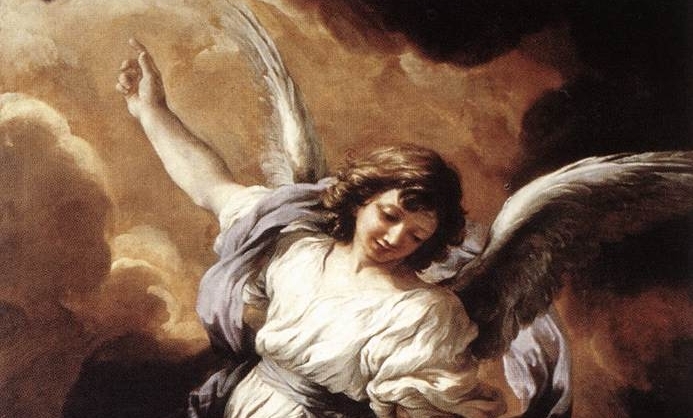As a child, I watched a number of movies about angels. “Angels in the Outfield” and its sequel (yes, it had one) “Angels in the Endzone” are probably harmless. The ending of “City of Angels” has a literal anthropomorphizing of an angel. Angels are a curiosity mysterious enough that we tend to hold onto whatever ideas are embedded into our memories. Today, on the feast of the guardian angels, I would like to propose a few alternatives to these popularizations by looking at a well-known prayer to our guardian angels.
Angel of God, my guardian dear, to whom his love commits me here. Ever this day be at my side, to light and guard, to rule and guide. Amen.
This little prayer focuses on four verbs to describe the activity of our guardian angels, and each teaches us something about the role of our guardian angels in our lives.
To light. For millennia the image of enlightenment has been used for instruction and teaching. Saint Thomas reminds us that, in terms of intellect, humans are at the bottom of the hierarchy. Every angel, even the least of them, is categorically superior in intelligence. This means that our guardian angels, even apart from their gifts of grace and glory, can teach us a thing or two. That’s exactly what St. Thomas says they do. Since our minds are weak and can easily fail, our guardian angels help us to hold onto the truth more firmly, and so we ask our guardian angels to enlighten us (ST I q. 113, a. 1).
To guard. True to their name, guardian angels also protect us from the assaults of the enemies of God. Saint Thomas gives this as reason to believe that even Adam, in the state of innocence, would have had an angel guardian (ST I q. 113, a. 4). In the same place, he states that even when we fall (as Adam did) into temptation, our guardian angels keep us from being harmed as much as the tempters want.
To rule. Since our guardian angels are not simply teachers of truth, but ministers of divine government, they never forget that their purpose in teaching is to lead us back to God. In this manner, we ask them not only to enlighten us with teaching, but also to rule and direct us toward the good. For, as St. Thomas tells us, even though we know the natural law, we sometimes struggle to apply it well, needing our angels to assist us (ST I q. 113, a. 1).
To guide. Like guarding, guiding can be understood defensively. For while a ruler might give direction from afar, a guide assists along the way by pointing out pitfalls in the path. While our guardian angels don’t and can’t make our decisions for us, they can give us nudges here and there to keep our feet on the narrow path.
These activities of our guardian angels are not extraordinary or miraculous. Their guardianship belongs to the execution of Divine Providence, much like any parent’s guardianship of children. Let’s make a new effort to appreciate and call upon these faithful angels, who are always willing to help us.
✠
Image: The Guardian Angel, by Pietro de Cortona







